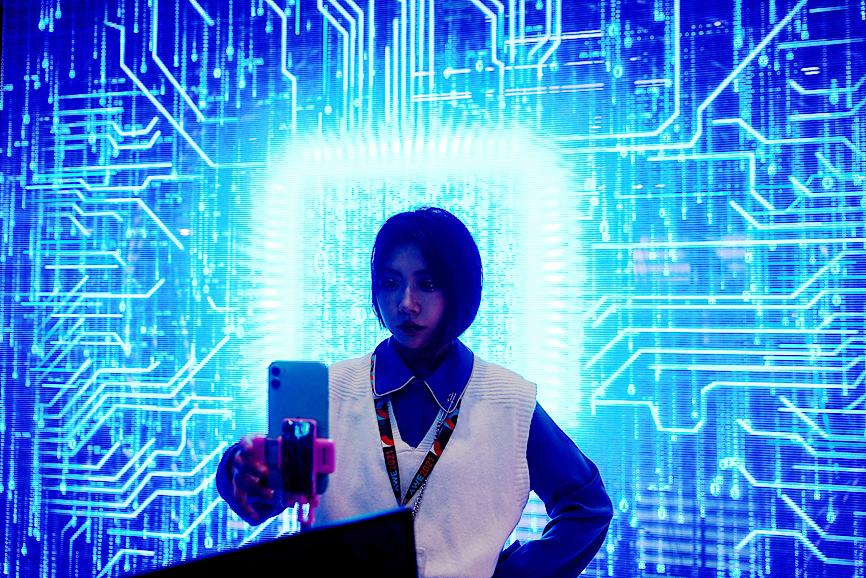US President Joe Biden’s administration on Thursday added seven Chinese supercomputer research labs and manufacturers to a US export blacklist amid a dispute with Beijing over technology and security.
The measure is the latest sign that Biden is sticking to the line taken by former US president Donald Trump toward Chinese tech industries seen by Washington as potential threats.
The decision adds to mounting conflict over the Chinese Communist Party’s (CCP) industrial plans, access to US technology, and accusations of computer attacks and theft of business secrets.

Photo: Reuters
The latest penalties block access to US technology for researchers and manufacturers that the US Department of Commerce said build supercomputers used by the Chinese military in weapons development.
Biden has said he wants better relations with Beijing, but has given no indication that he will roll back sanctions imposed by Trump on Chinese telecom equipment giant Huawei Technologies Co (華為) and other companies.
The CCP has responded by declaring that accelerating efforts to transform China into a self-reliant “technology power” will be this year’s top economic priority.
Chinese-designed supercomputers have set records for speed, but are assembled from processor chips and other hardware made in the US.
They can be used in weapons development by simulating nuclear explosions, and the aerodynamics of high-speed or stealth aircraft and missiles.
The latest US penalties affect the National Supercomputing Centers (國家超級計算中心) in the cities of Jinan, Shenzhen, Wuxi and Zhengzhou; Tianjin Phytium Information Technology Co (天津飛騰信息技術); the Shanghai High-Performance Integrated Circuit Design Center (上海集成電路技術與產業促進中心); and Shenzhen Sunway Micro-electronics Co (深圳信維微電子).
Meanwhile, US telecom regulators are in the process of stripping three Chinese phone carriers of the right to operate in the US.
Trump also tried to force the Chinese owner of video service TikTok to sell its US unit and issued an order barring Americans from investing in securities of companies deemed by the Pentagon to be linked to China’s military.

Taiwan Semiconductor Manufacturing Co (TSMC, 台積電) secured a record 70.2 percent share of the global foundry business in the second quarter, up from 67.6 percent the previous quarter, and continued widening its lead over second-placed Samsung Electronics Co, TrendForce Corp (集邦科技) said on Monday. TSMC posted US$30.24 billion in sales in the April-to-June period, up 18.5 percent from the previous quarter, driven by major smartphone customers entering their ramp-up cycle and robust demand for artificial intelligence chips, laptops and PCs, which boosted wafer shipments and average selling prices, TrendForce said in a report. Samsung’s sales also grew in the second quarter, up

On Tuesday, US President Donald Trump weighed in on a pressing national issue: The rebranding of a restaurant chain. Last week, Cracker Barrel, a Tennessee company whose nationwide locations lean heavily on a cozy, old-timey aesthetic — “rocking chairs on the porch, a warm fire in the hearth, peg games on the table” — announced it was updating its logo. Uncle Herschel, the man who once appeared next to the letters with a barrel, was gone. It sparked ire on the right, with Donald Trump Jr leading a charge against the rebranding: “WTF is wrong with Cracker Barrel?!” Later, Trump Sr weighed

LIMITED IMPACT: Investor confidence was likely sustained by its relatively small exposure to the Chinese market, as only less advanced chips are made in Nanjing Taiwan Semiconductor Manufacturing Co (TSMC, 台積電) saw its stock price close steady yesterday in a sign that the loss of the validated end user (VEU) status for its Nanjing, China, fab should have a mild impact on the world’s biggest contract chipmaker financially and technologically. Media reports about the waiver loss sent TSMC down 1.29 percent during the early trading session yesterday, but the stock soon regained strength and ended at NT$1,160, unchanged from Tuesday. Investors’ confidence in TSMC was likely built on its relatively small exposure to the Chinese market, as Chinese customers contributed about 9 percent to TSMC’s revenue last

LOOPHOLES: The move is to end a break that was aiding foreign producers without any similar benefit for US manufacturers, the US Department of Commerce said US President Donald Trump’s administration would make it harder for Samsung Electronics Co and SK Hynix Inc to ship critical equipment to their chipmaking operations in China, dealing a potential blow to the companies’ production in the world’s largest semiconductor market. The US Department of Commerce in a notice published on Friday said that it was revoking waivers for Samsung and SK Hynix to use US technologies in their Chinese operations. The companies had been operating in China under regulations that allow them to import chipmaking equipment without applying for a new license each time. The move would revise what is known